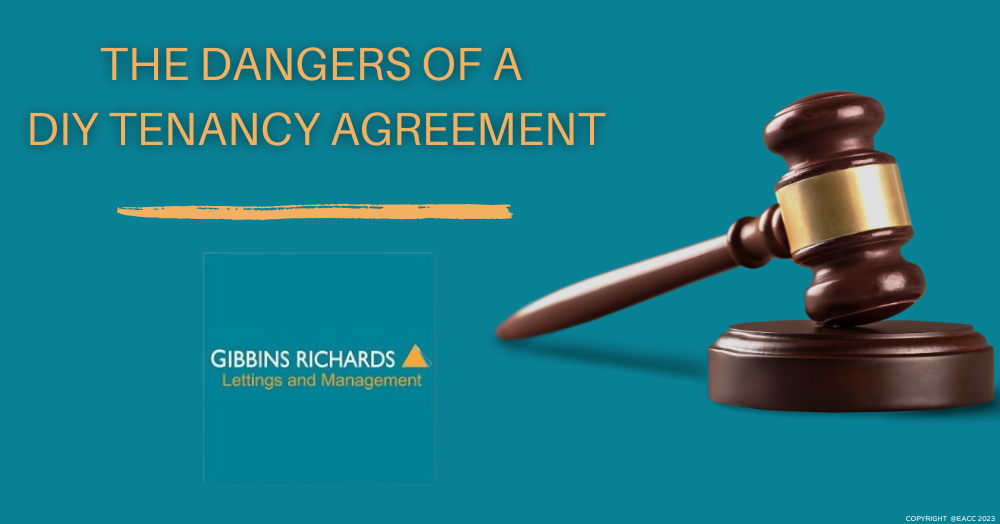Blog
- Details
- Hits: 371
Type ‘tenancy agreement’ into Google and you’ll get thousands of results offering free online templates and guides to writing your own rental contract.
So why bother using a letting agent to sort out the tenancy agreement if you can do it yourself? What could possibly go wrong?
Well, quite a lot. Hastily downloading a template from the internet and high-fiving yourself for a job well done could prove to be a costly mistake.
It might not become apparent for months or even years, but if you get into a dispute at the end of a tenancy, or want to regain possession of the property, you could find your contract is worthless.
In this quick read, we look at the dangers of a DIY tenancy agreement.
Legally unsound
Incorrect legal terms, illogical clauses, confusing wording… all of these can cause problems when a tenant moves out or challenges something in the contract. There have also been many changes to renting rules over the last few years (with more set to take effect soon), which could render your DIY agreement useless.
Using an agent with access to a properly drafted, legally sound, up-to-date tenancy agreement can save you a fortune in stress, hassle and expense in the long run.
Other legal requirements
At the beginning of a tenancy, landlords must provide the tenant with a number of important documents – not just a tenancy agreement. These include gas and electrical safety certificates and information about the relevant deposit service the landlord uses.
A freestyling approach to establishing a tenancy could mean you fail to get this paperwork right – an outcome that could invalidate whatever tenancy agreement you do have. This means any dispute will be even more protracted and expensive.
Notice periods
The same applies to serving notice. If the tenancy was set up incorrectly without all the paperwork provided to the tenant, it could invalidate any notice you serve. Are you up to date with all the recent rule changes to notice periods? An agent definitely will be.
Setting up a DIY tenancy agreement might seem like a way to save money, but in the long run, you could be left seriously out of pocket. Protect your investment, and let Gibbins Richards Lettings and Management Ltd do the hard work for you. Contact us today.
- Details
- Hits: 359
As a landlord, as well as managing the finances, the property and any repairs or maintenance, you also have to remember to look after your tenants. Whilst nine times out of ten you’ll never have to deal with anything too difficult, sometimes relationships can be testing.
So, what’s the best way to deal with issues that arise during a tenancy? In this quick read, we look at ways to deal with such problems.
Help avoid fall-outs
You can’t control the arguments that arise between tenants; however, you can try to avoid future rows by setting out clear advice around the following areas:
Liabilities
The key here is the term ‘jointly and severally liable’. Ensure tenants understand they’re both/all responsible for rent and other obligations set out in the contract. The tenancy agreement makes them equally responsible for the duration they have signed for.
Contact details
Ensure all the tenants are provided with important information relating to the tenancy, such as who manages the property and who to contact for emergencies or repairs.
Guarantors
Sometimes, a tenancy is granted with a family member/friend acting as a guarantor. The guarantor usually guarantees the whole tenancy, so if your tenants are friends, it is important that the guarantor understands that they are liable for both tenants.
Notices
Generally, one tenant can serve notice on behalf of both tenants to terminate the joint tenancy. However, a different process is followed if some tenants want to remain in the property whilst others want to leave – so it’s important they’re aware of this.
What to do if your tenants fall out
Sometimes, when people live together, things don’t work out. But what can you do as the landlord? It’s important to stay neutral. Perhaps one tenant is calling to complain about another, or someone wants to move out; whilst you can try and mediate between tenants, this could lead to more issues, so tread carefully. If there are queries about bills, you can advise who is responsible for things like utilities and rental payments but don’t agree to anything you’re unsure about.
Top tip: If a tenancy needs to end early, make sure you’ve checked the tenancy agreement carefully for any costs the tenants may incur and take the advice of your letting agent.
What to do if you fall out with your tenant
No matter how hard you try, you can’t get on with everyone. It’s important to remain polite and business-like in such situations and try to resolve repairs and maintenance issues quickly to avoid escalating the situation.
If you and a tenant can’t see eye to eye, it may be worth speaking to your agent to see if they can take over the property’s management. This will save any unpleasantness and hopefully make the tenancy run smoothly.
If you’re looking to rent out a property, speak to our team at Gibbins Richards Lettings and Management Ltd.
- Details
- Hits: 361
Not since 2008, when Katy Perry stormed the music charts and Gavin and Stacey ruled the small screen, have interest rates been as high as they are today.
As a result, many mortgage holders are looking for ways to trim their outgoings to ease the financial burden. Homeowners are putting DIY projects on the back burner and reducing their spending on holidays and takeaways, while some buy-to-let landlords are toying with the idea of self-managing their rental portfolio (despite the fact agent fees are tax deductible).
But while the prospect of saving a bit each month on letting agent fees might seem attractive, in the long run, it could be a false economy.
Here are some reasons why self-managing your rental might not save you any money at all.
Maintenance and repairs
A good letting agent will schedule and manage maintenance and conduct regular inspections to ensure potential issues are spotted early. They’ll identify and address minor problems, such as leaky pipes or blocked gutters before they can mushroom into bigger, more expensive problems.
Avoid void periods
Good tenants are far more likely to stay in a property if it’s well managed and they feel their concerns are being listened to. But if you have a busy career or travel regularly, being on call around the clock may be unfeasible. A good letting agent can help foster a long-lasting tenancy and avoid void periods where you’ll still have to stump up for the mortgage and council tax.
Red tape
The number of private rental sector regulations has ballooned in the past few years, and even more are in the pipeline. Landlords who mess up and get something wrong can face hefty fines or messy legal disputes. Having a professional on your team who understands the ins and outs of the law can save you significantly in the long run.
Safety checks
A landlord has a legal obligation to ensure their rental property is safe and secure and must meet strict electrical and boiler safety checks regulations. Fail to do this and your landlord insurance could be invalidated, or you could even face prosecution – an outcome that could be very costly.
If you’d like to learn more about our property management services, contact us here at Gibbins Richards Lettings and Management Ltd today.
- Details
- Hits: 373
How can you spot a top letting agent from a master of mediocrity? Read on to find out.
Landlords use letting agents for all sorts of reasons. Some need help navigating red tape and lettings legislation, while others want a third party to deal with inspections, inventories and disputes. And some just want peace of mind and to know that their investment property is being managed by a safe pair of hands. Whatever your motivation as a landlord, once you’ve decided to use a letting agent, it’s important to choose a good one.
Here are some useful tips to help you weed out the posers from the professionals.
Recommendations: Ask other landlords in your area who they use. Word-of-mouth endorsements can be invaluable.
Marketing: Look at how different agents advertise rental properties and drum up business. Does their online marketing look professional? Does it target high-quality tenants?
Rapport: Find an agent who is responsive and has a professional manner. Choosing someone with whom you can develop a solid business relationship and a sense of trust is essential.
Value for money: Most agents offer different levels of service, ranging from tenant selection services to full property management. When researching agents, ask for a list of fees so you know what you’ll get for your money. Some agents might charge less, but if they’re disorganised or cut corners, they could cost you more in the long run because they’ve missed out on a vital check or deadline.
Organised: Ask prospective agents how they manage and schedule repairs, maintenance and safety inspections. A good letting agent has systems in place to ensure their clients meet important deadlines for things like electrical and boiler checks.
Industry body membership: While membership to a professional body is voluntary, it’s a sign the agent takes their job seriously and has access to training, courses and seminars about changes in the industry.
Legal knowledge: The lettings sector has changed enormously in recent years, with the number of regulations landlords must follow skyrocketing. Quiz agents on their legislative knowledge; if they’re wishy-washy on the detail, steer clear.
If you’d like to know more about our property management services, contact us at Gibbins Richards Lettings and Management Ltd today.
- Details
- Hits: 357
At last summer is here, so what are your plans?
Have you booked an exciting getaway in an exotic location? Or is the aim to kick back and relax on home turf?
Whatever you’ve lined up, it’s worth taking note of the common concerns that can crop up in rented accommodation during the summer.
If there’s a garden at your rental property:
- Check your contract to ensure you understand what’s expected of you in terms of maintenance. Commonly, tenants are expected to carry out general tasks such as watering and mowing – and in summer, you’ll most likely need to do both quite regularly.
- If you have children, paddling pools and trampolines might seem like the ultimate summer garden accessories – just bear in mind that at the end of the tenancy, you’ll be expected to return the garden in the same state as it was when you moved in. So if the grass under a trampoline or paddling pool dies off (as it often does), you’ll need to rectify it.
- Keen gardeners should get permission from the landlord before undertaking any major planting or landscaping projects. Planting in pots may be preferable, so you can take any plants that you lovingly tend to with you when you move on.
- If you’re socialising outside, be mindful of the neighbours. Don’t play loud music into the early hours of the morning or let things get too lively.
Other issues
- Burglars prowl about in the summer months looking for easy entry to properties, so be vigilant if you open windows or doors in hot weather.
- Always lock up carefully before you go out and be particularly cautious if you’re going away on holiday. Check and check again to ensure everything is safe and secure. The last thing you want is to return from a brilliant holiday to find you’ve had intruders.
- If you’re going away for an extended period, let your landlord know. Some contracts specify that you notify your landlord if you’re going to be away for more than 14 days. Even if you’re not legally required to do so, it’s good to do it as a courtesy. It also means that your landlord can avoid bothering you with non-urgent queries when you’re on holiday.
Looking for a new property to rent? Get in touch with us here at Gibbins Richards Lettings and Management Ltd today.














